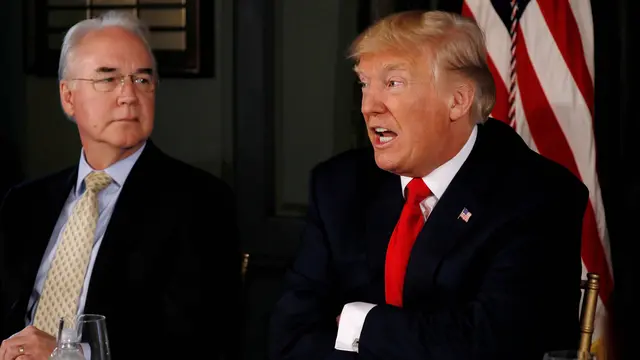- Trump warns "fire and fury" for DPRK if it threatens US
- Pyongyang said ready to give Washington a "severe lesson"
- Possible DPRK already has miniaturized nuclear arms
President Donald Trump warned Pyongyang on Tuesday against making any further threats against the United States.
"DPRK
best not make any more threats to the United States. They will be met
with fire and fury like the world has never seen," Trump told reporters
at the Trump National Golf Club in Bedminster, New Jersey.
As
tensions escalated, the Democratic People's Republic of Korea (DPRK)
said it was "carefully examining" a plan to strike Guam, site of a US
military base.
(US
President Donald Trump speaks about DPRK during an opioid-related
briefing at Trump's golf estate in Bedminster, New Jersey, August 8,
- /Reuters Photo)
A DPRK military spokesman,
in a statement carried by state-run KCNA news agency, said the plan
would be put into practice once leader Kim Jong Un makes a decision.
In
another statement citing a different military spokesman, DPRK said it
could carry out a pre-emptive operation if there were signs of a US
provocation.
Washington has warned it is ready to use
force if need be to stop DPRK's ballistic missile and nuclear programs
but that it prefers global diplomatic action, including sanctions.
The
consequences of any US strike would potentially be catastrophic not
only for people in the DPRK but also the Republic of Korea (ROK), Japan
and the thousands of US military personnel within range of any DPRK
retaliatory strikes.
The UN Security Council
unanimously imposed new sanctions on Pyongyang on Saturday over its
continued missile tests, that could slash the reclusive country's 3
billion US dollars annual export revenue by a third.
Pyongyang
has made no secret of plans to develop a nuclear-tipped missile able to
strike the United States and has ignored international calls to halt
its nuclear and missile programs.
It says its intercontinental ballistic missiles (ICBMs) are a legitimate means of defense against perceived US hostility.
It has long accused the United States and South Korea of escalating tensions by conducting military drills.
Tension rise
(DPRK missiles are displayed during a military parade past Kim Il Sung square in Pyongyang, January 6, 2016. /AFP Photo)
Tensions have risen since DPRK carried out two nuclear bomb tests last year and two ICBM tests last month.
Republican US Senator John McCain said Trump should tread cautiously when issuing threats to DPRK unless he is prepared to act.
"I
take exception to the president’s comments because you got to be sure
you can do what you say you’re going to do,” he said in a radio
interview.
The Trump administration's attempts to
pressure DPRK into abandoning its nuclear and missile ambitions have so
far gained little traction.
US Defense Secretary Jim
Mattis has warned of an "effective and overwhelming" response against
DPRK if it chose to use nuclear weapons but has said any military
solution would be "tragic on an unbelievable scale."
The
United States has 28,500 troops in the ROK to guard against the threat
from the north. Japan hosts around 54,000 US military personnel, the US
Department of Defense says, and tens of thousands of Americans work in
both countries.
Seoul is home to a population of
roughly 10 million, within range of massed pre-targeted DPRK's rockets
and artillery, which would be impossible to destroy in a first US
strike.
The Washington Post reported on Tuesday that
Pyongyang has successfully produced a miniaturized nuclear warhead that
can fit inside its missiles, according to a confidential US intelligence
assessment.
But US intelligence officials said there
is no reliable evidence it has mastered all three – an ICBM, a
miniaturized nuclear warhead and a nosecone robust, much less tested and
combined them into a weapon capable of hitting targets in the United
States.
US intelligence officials, who spoke on
condition of anonymity, also said there is no certainty about the number
of nuclear warheads DPRK has assembled, with estimates ranging from 20
to as many as 60 and most experts leaning toward the lower end of that
range.
DPRK's ICBM tests last month suggested it was making technical progress, Japan's annual Defence White Paper warned.
 简体中文
简体中文





